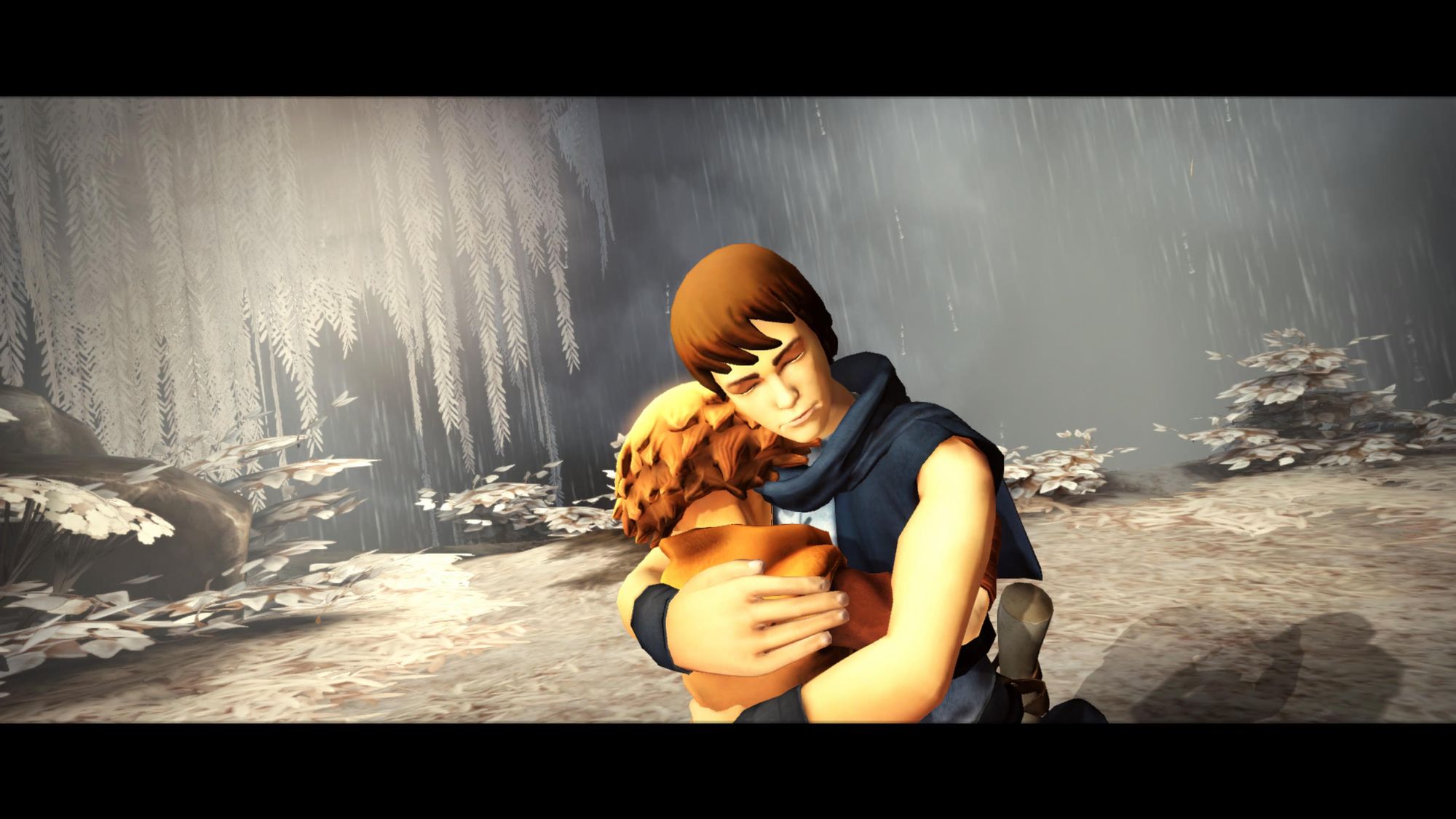Grief and the Stories That Connect Us
The journey of grief with Brothers: A Tale of Two Sons
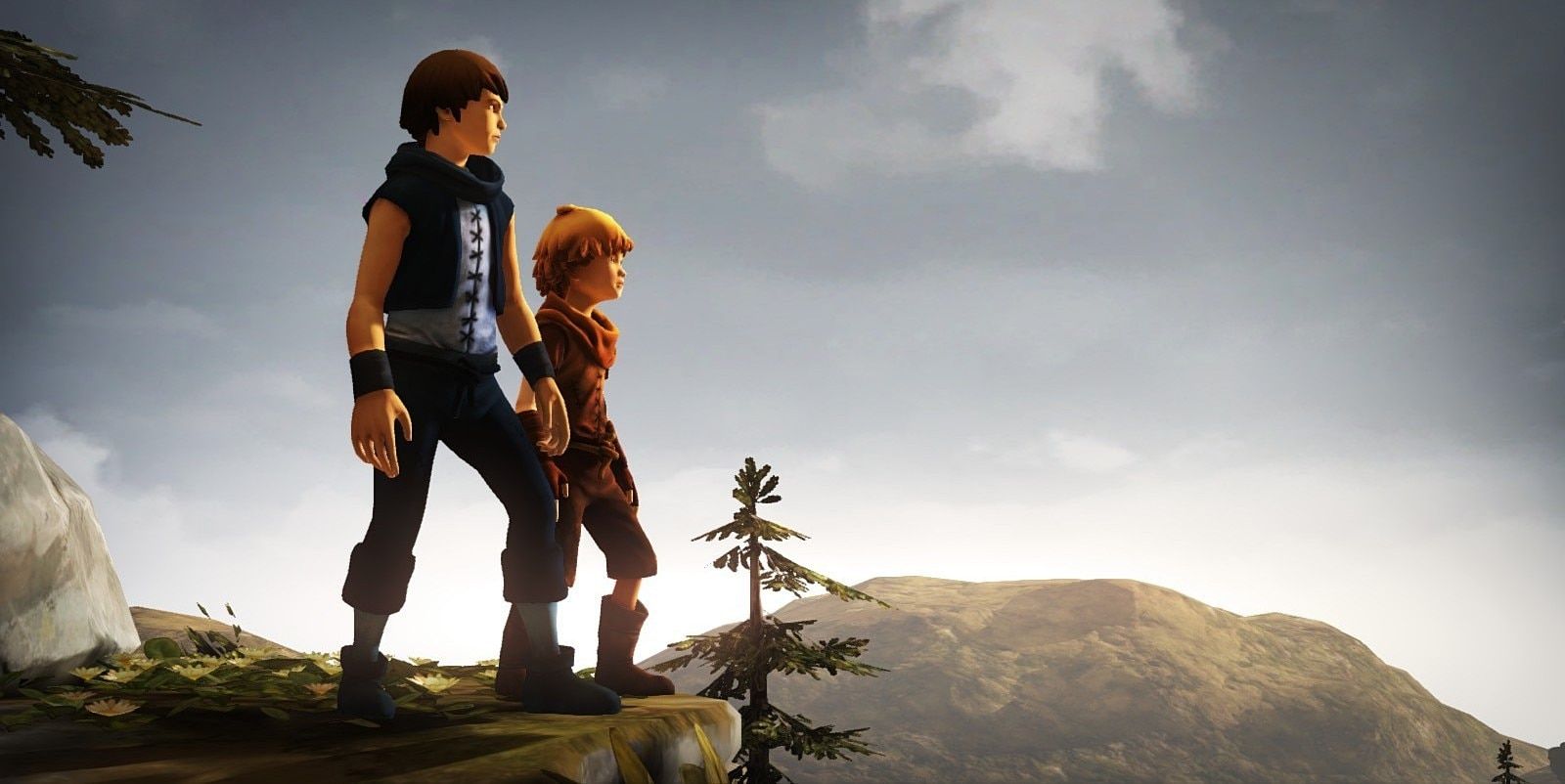
“Do you not know that a man is not dead while his name is still spoken?”
“No one is finally dead until the ripples they cause in the world die away, until the clock wound up winds down, until the wine she made has finished its ferment, until the crop they planted is harvested. The span of someone’s life is only the core of their actual existence.”
- Terry Pratchett

In the brevity of Brothers: A Tale of Two Sons - a narrative without true words - there is more delivered in its mechanics alone than most tales pour on a page. It's an expression of the medium's strength; of its ability to communicate and connect us.
And sometimes, art communicates to us at just the right moment in our lives.
The story follows the titular siblings who journey from home to find a cure for their father's illness. Their mother is long gone and so they must rely solely on each other, using their individual traits and strengths as they journey through a fairy-tale world.
It's a story of childhood, of growing up, of strength, kindness, courage, and the bond we share with a sibling.
A Story of Loss
Years ago, I lost my brother. I didn't know how to live without him because I never had to. He was there from the very beginning.
Videogames were something else we had shared from the very beginning. Whether that was taking turns, playing co-op, or playing parallel on different consoles in the same room, our burgeoning love of storytelling was a common thread in our bond. Putting our money together to get a new game or upgrade our PC was an early lesson in economics. Convincing one another of which game was the right choice taught us communication. Accidentally overwriting each other's saves before we had two memory cards taught us conflict resolution.
We looked out for each other by yelling "Cinematic!" when one of the glorious FMVs of the PS1 era began so that the other could come to see it or dodge spoilers. We scoured magazine stores for news, made long walks across town to game stores when we had no ride, and risked computer viruses when downloading leaked game tests or when pirating. He got the red and gold versions of Pokémon, I got the blue and silver versions. We avenged each other in Diablo 2's online. We combined our brains to solve the most obscure titles. We were each other's Player 2.
There comes a moment after someone passes when the funeral is done, the calls stop coming, and the world seems to go back to doing what it was doing. You're apparently supposed to do the same thing. But I didn't want to move forward and leave him behind. I didn't want to see him disappear in the rearview mirror. That would be the real death. But time slips forward whether you stand still or not.
Feeling lost, I looked to my backlog of films, books, and games that the busy year and summer away had left me. Brothers was among the games, something I had been interested in since it was announced. But now it held a different appeal.
My plan was to play Brothers as a way for my brother and me to go on one last adventure. He was the older character, I would be the younger. We were so close that it wasn't hard to hear his voice in my head, to know what he would say in any given situation, what he would think of things, and how he'd react to events. We had a dialogue as we played one last game together.
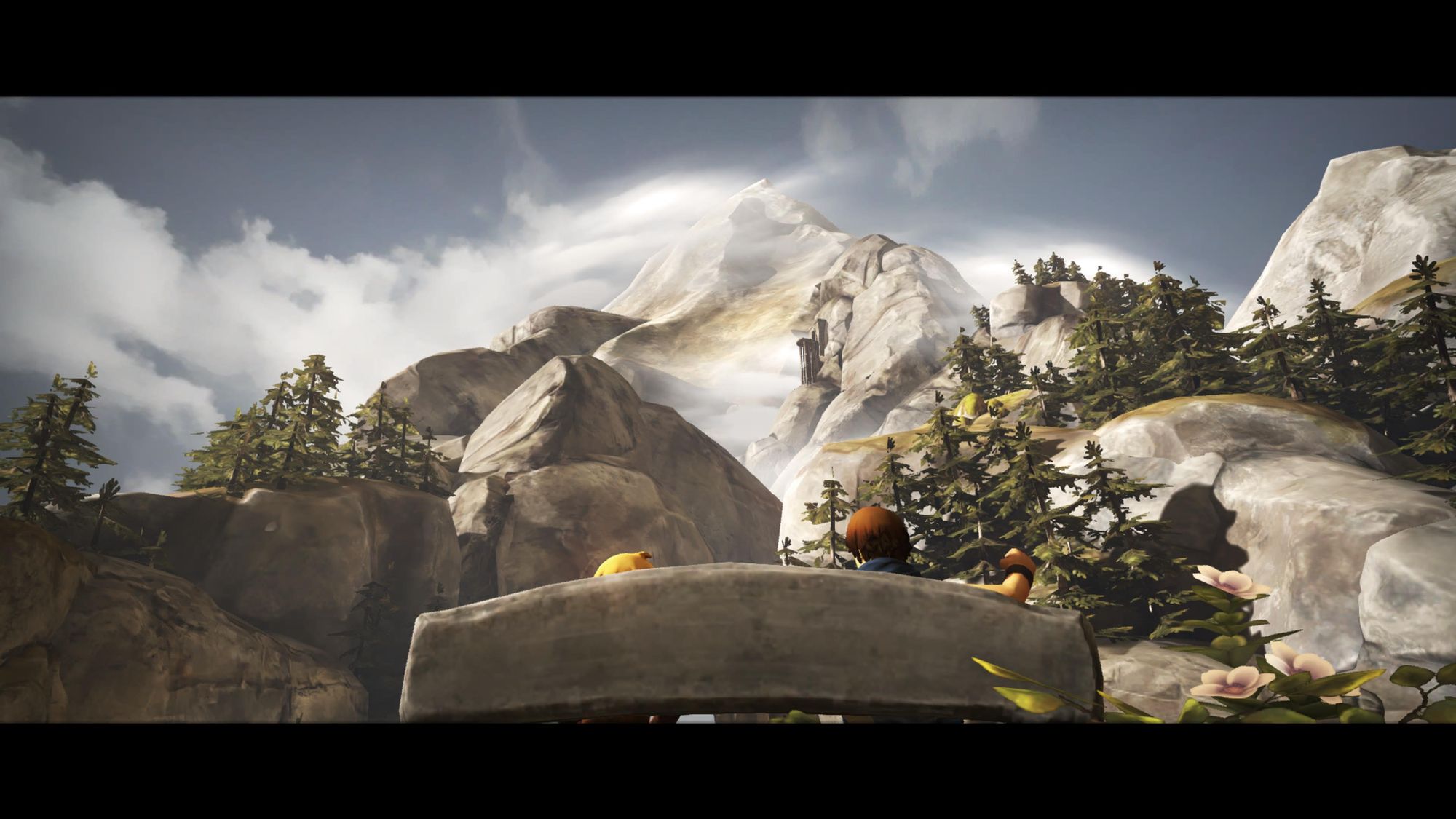
The difficulty of interconnectedness
Brothers is not a co-op experience. Despite its obvious setup, one player controls both siblings. The left analog stick and L2 control the older brother, while the right stick and R2 control the younger brother. The controller is two halves; two people intrinsically linked and working together.
This is not immediately simple. Controlling two characters at once is not a natural feel. Moving in sync or using the triggers to get them to climb up cliff ledges at the same time can have one feeling uncoordinated, like the age-old game of rubbing your belly and patting your head at the same time. At first, I had to make sure to keep the older brother on the left side of the screen and the younger one on the right, so they matched with the sticks. The discomfort makes you feel less comfortable and capable, in line with two brothers learning to work together as they leave home on a dangerous adventure. Like any sort of relationship between two people, it takes time and effort to make it effortless.
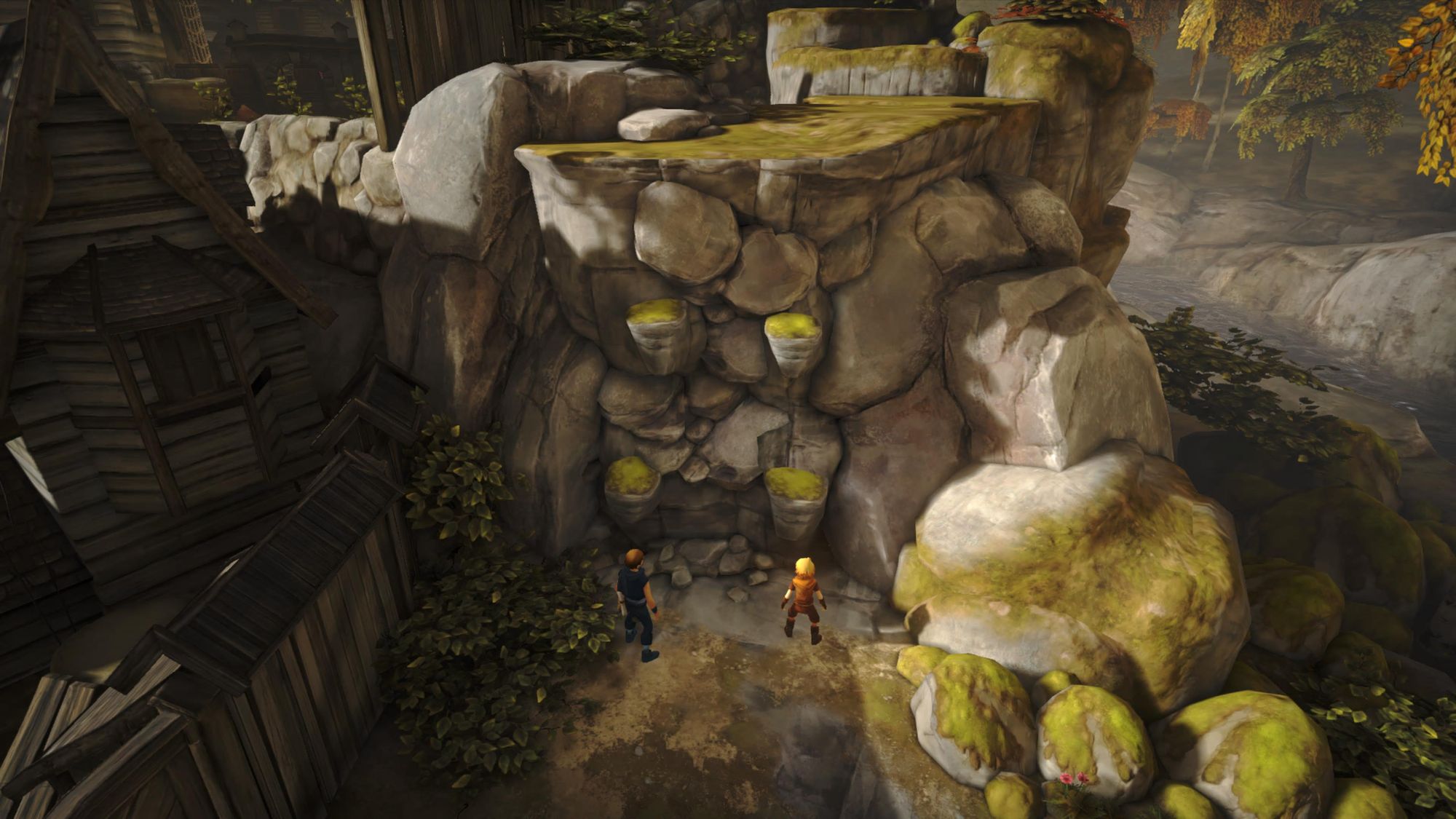
As you progress, a beautiful thing happens naturally. You find yourself growing better at it; your hands working together perfectly as you solve puzzles, help each other climb, paddle, and narrowly avoid death. Your growing ease with the controls represents the two brothers' growing bond, their trust in one another, and faith in each other's abilities. The younger, having witnessed his mother drown, fears water and cannot swim, so he must ride on his brother's shoulders. The older is stronger and taller, while the younger is lighter and can squeeze through gaps. There is a prevalent interdependency between the brothers and thus the controls. One brother does not feel more important than the other, it feels like a singular unit.
The brothers speak an unknown language to one another, meaning this growth is delivered nonverbally. The narrative of this growing relationship is felt through its mechanics; your very improvement changing the perception of the brother's relationship. It's a story you help create.
The bond of brothers is not something inherent at birth, it's built on through the years, forged in fires of conflict, in the need for cooperation, and through moments of joy. It's made through years of playing together, getting into fights, and working together in mischief. My experience both as a brother and playing games blurred the line between what is delivered narratively and what I brought to it. This sort of storytelling always ends up being uniquely powerful on a personal level. Suddenly, I couldn't tell if I was playing the game with or without him.
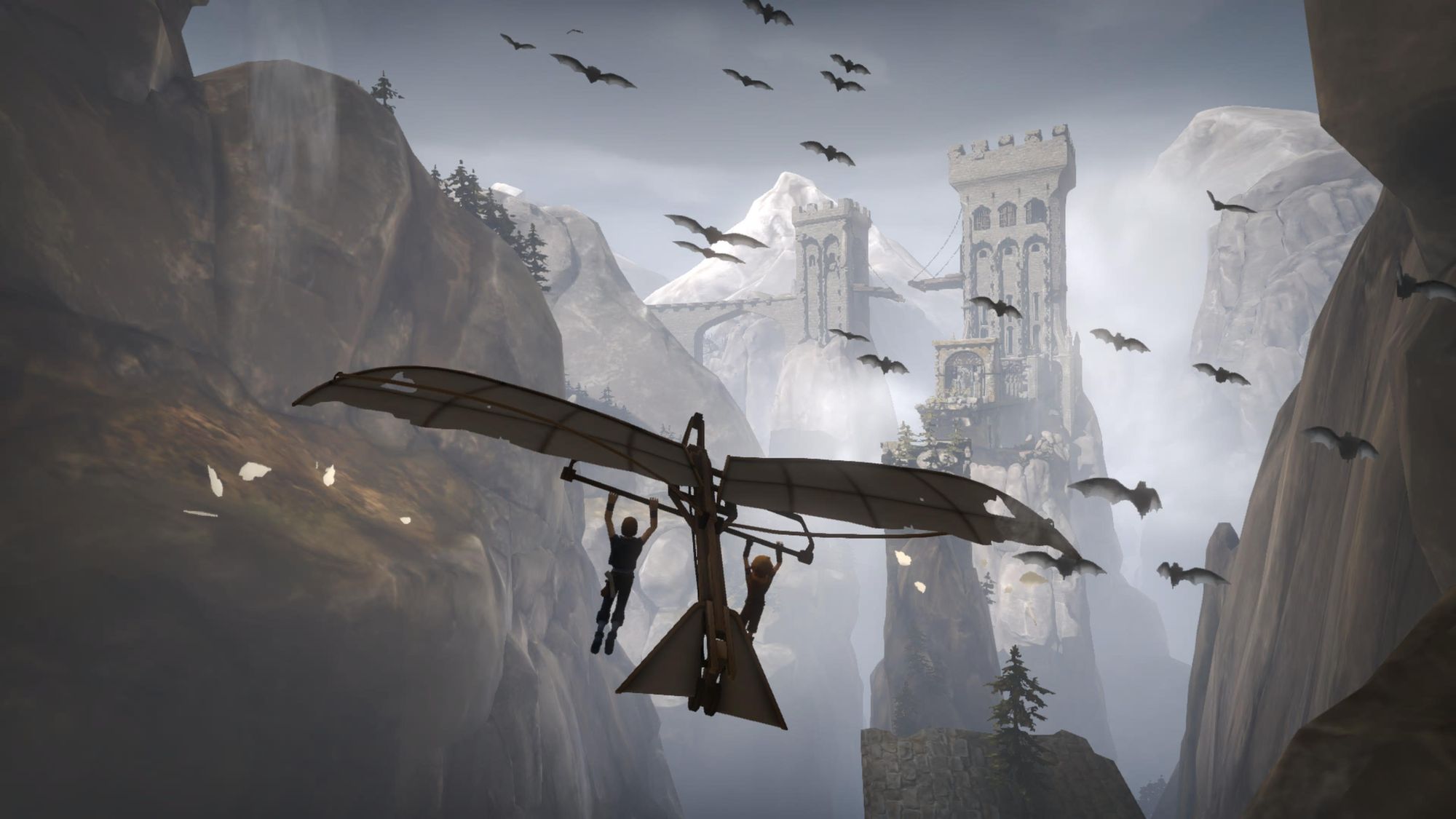
To adventure together
The journey the brothers embark upon mimics growing up. The earliest hours have you working around the village, causing mischief, and navigating around the local bully. It revels in a sense of childhood. The idea of going on a grand adventure, where wonder could be found in the mundane and make-believe leads to cooperation. The fairy tale aesthetic lends itself beautifully to this theme.
Slowly, themes of death and a loss of innocence creep in. The two glimpse the horrors of war as they navigate an old battlefield of dead giants. They help a man who is suicidal after the loss of his wife and child. They rescue a woman who is about to be sacrificed from a cult, and flee an invisible terror in a ravaged city.

Then suddenly...
The older brother dies.
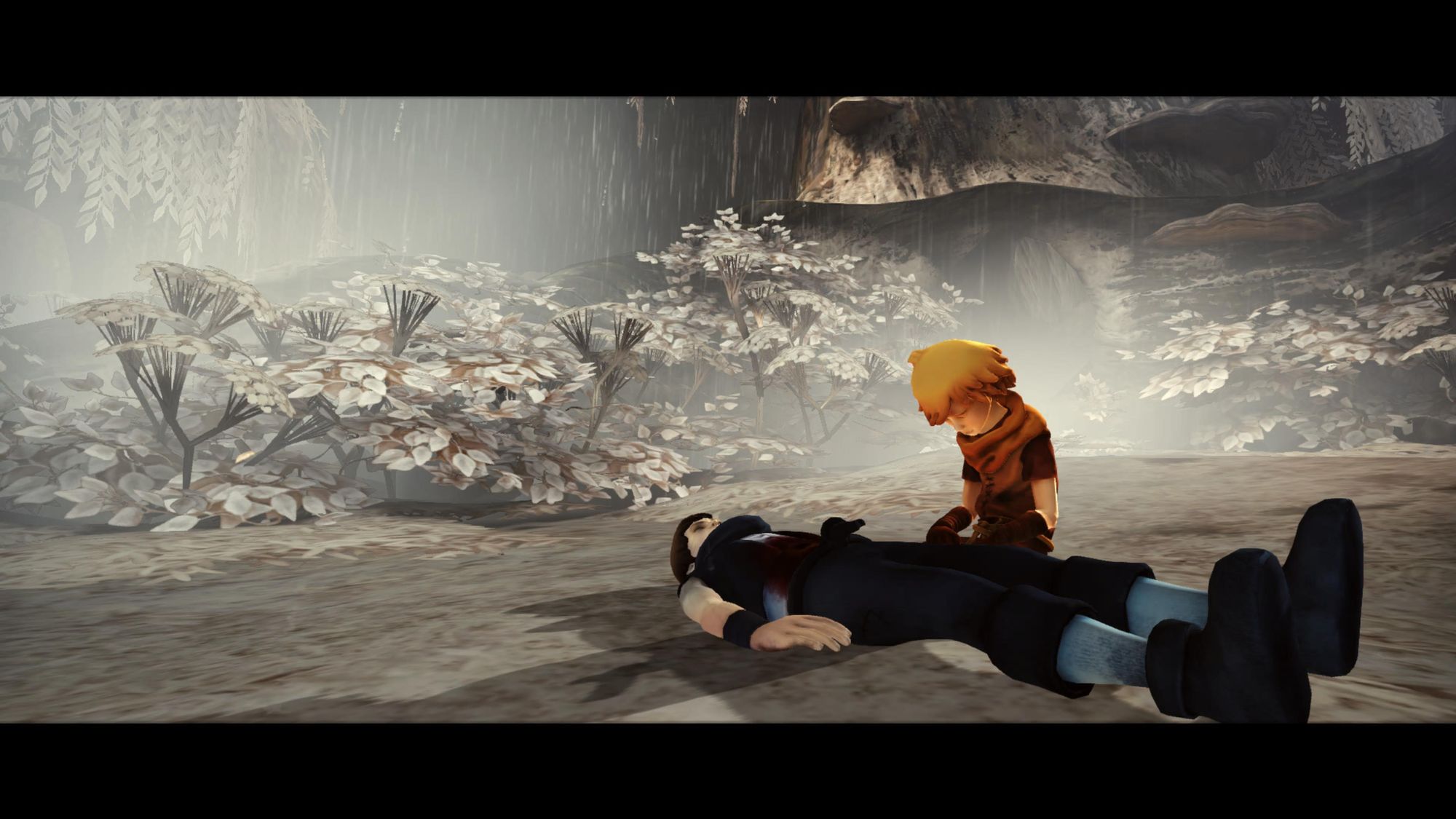
Crushed as I was, I had to laugh a little at this. Here I was, trying to have one last gaming adventure with my brother - to live in a world where he wasn't gone, and I picked the one game that was going to reinforce reality. Maybe I should have seen it coming, I don't know, but in a game based entirely on a core concept of two as one, with the veneer of a magical fairy tale, I was quite blindsided. But that's life. My brother and I were working together in this beautiful world, and I never thought that would end. I really didn't.
Brothers gave me that time again, but it's a condensed version. You can't have the ride without it ending. Sometimes that ride is longer than others, but loss is at the end of all journeys, no matter what. There is a folly to trying to hold on or pretend otherwise.
You can't take a picture of this, it's already gone.
- Nathaniel Fisher, Six Feet Under
The younger brother runs and grabs the cure for their father from a fountain, and desperately tries to pour it on his brother, but it doesn't work. It's not a fairytale. The boy must bury his brother and go on alone.

People speak of siblings as having an almost psychic connection or "sharing a brain." My brother and I could communicate with a look across the room from each other. Looks that said, "Good work", "Let's get out of here", and "Get a load of this guy."
When he passed the world became silent. I couldn't hear him anymore and that silence was loud. I had always heard the expression that losing someone close to you is like a part of you being ripped off, but I had no idea. My brother was my best friend and half my person. The left side of my controller.
The loss of the older brother is felt like the loss of a limb. It leaves you with half a controller. The left analog stick and L2 trigger now do nothing. You have lost a part of yourself.
It's by design that the right analog stick was set to the younger brother's movement. It can't be changed in the options. Any other game uses the left for movement and the right for camera or aiming. It's a game design tradition that is second nature to us all. Due to this tradition, using the right stick alone feels wrong the way the world feels when you lose someone close.
Strength in memory
After my brother passed, I eventually looked at our text message history. In one of our last exchanges, I had flown away for a summer of work and had to take a test I was nervous about. His response to that was there on my screen, and it was different now, recontextualized by time. I'd carry it with me wherever I went.
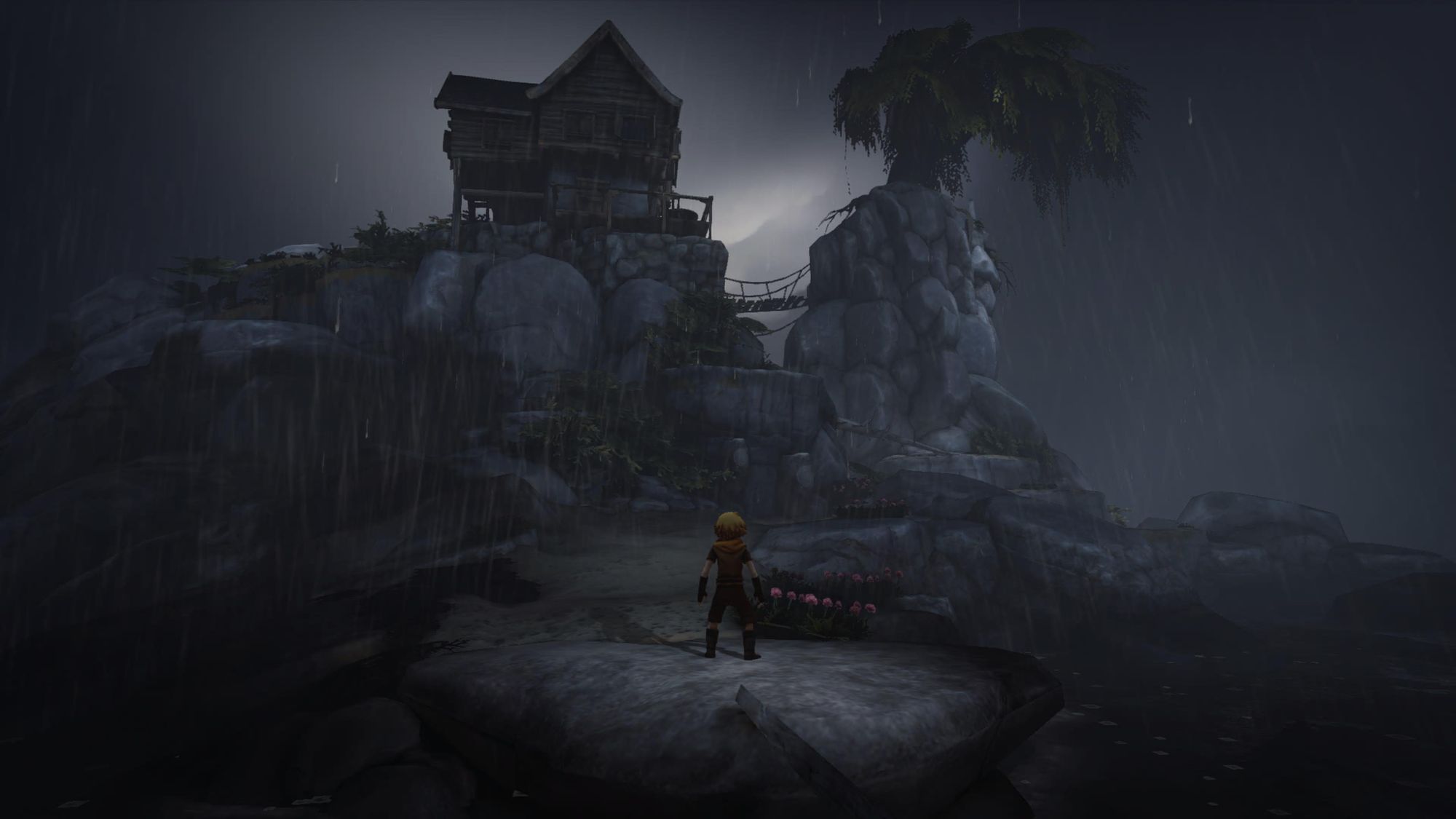
The little brother arrives back home, where the story began, his and the doctor's house, where his father rests, is above him on a towering cliff. A storm rages in the night, his idyllic home now a place of darkness, and the boy looks so small in the face of it all. With the cure in hand, he makes his way forward.
A small cliff edge with room for two that you've seen multiple times before in the game punctuates the loss. You were just here, how can you be gone? In the beginning, it felt difficult climbing with two, but now it feels worse. I was so used to your presence.
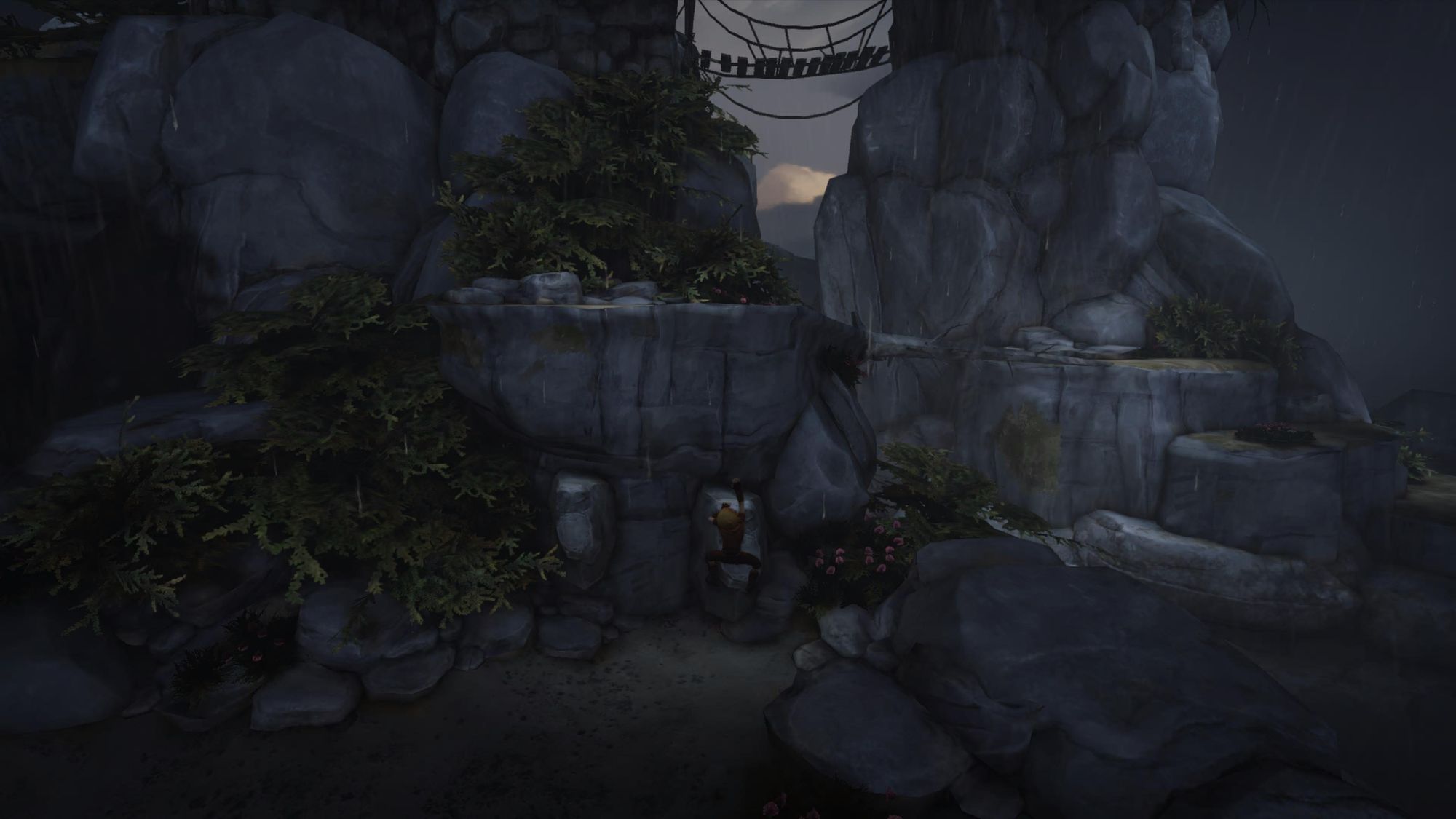
Just as the brother is almost there, he runs into something that stops him in his tracks, something he could never navigate without his brother.
Water.
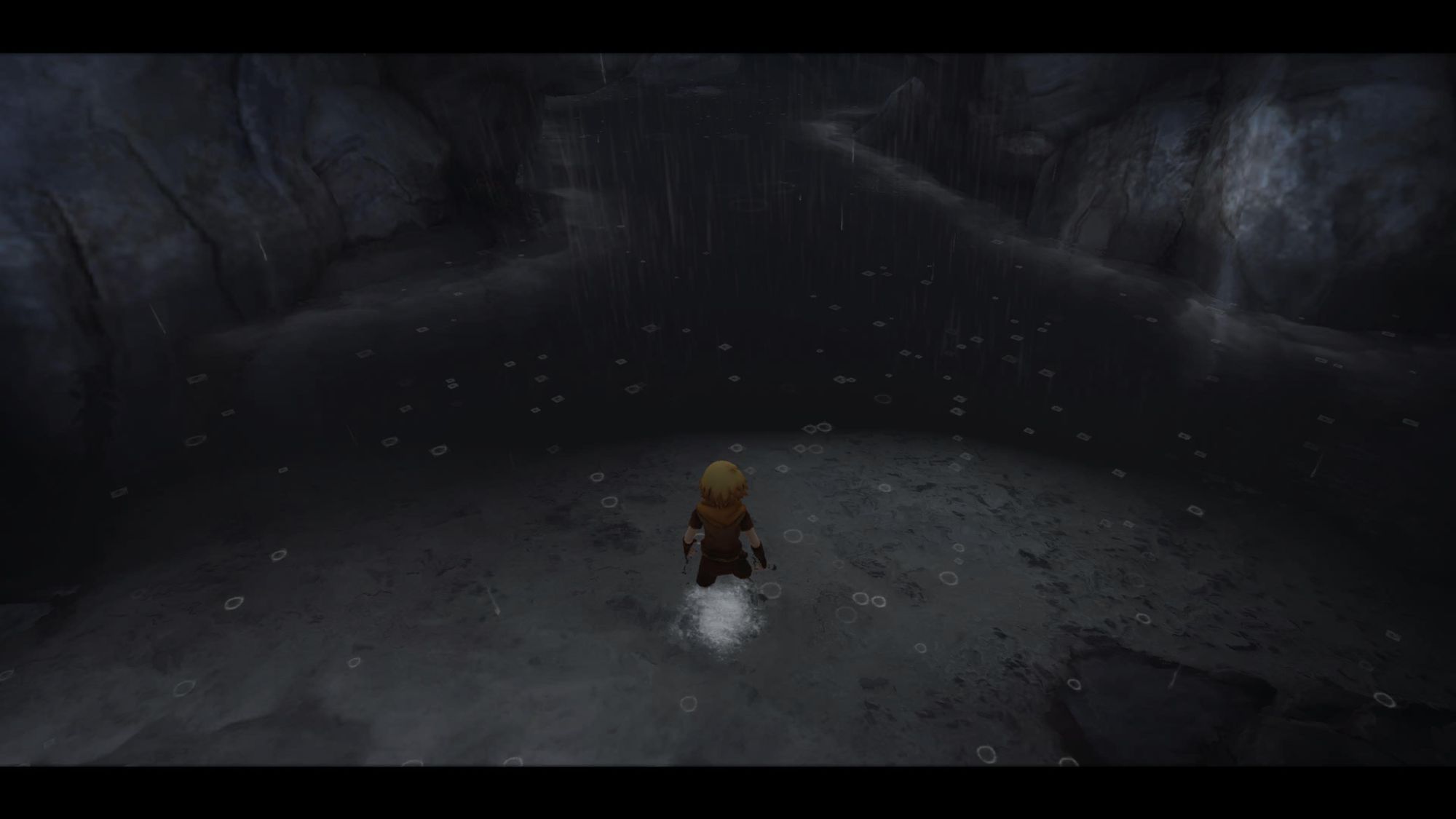
This is the moment Brothers has been building toward. There is no other way to get across but he still is terrified of the water, unable to swim, and any thought that he - that you - could do this alone is wiped away.
Then you press L2.
With the voice of his brother sounding in his mind, he swims; he swims in strong, gasping strokes filled with courage and rage. Suddenly the whole controller is working again. Because while grief forever ebbs and flows, he uses his brother's memory and strength to swim across that current. To pull the lever he wasn't strong enough to. To make a jump up a cliff where before he needed a lift.
This is how the people we love live on. And it's here the stories' message becomes as clear as the text I saw on my phone:
"You're going to be fine, brother."
